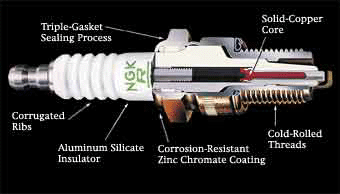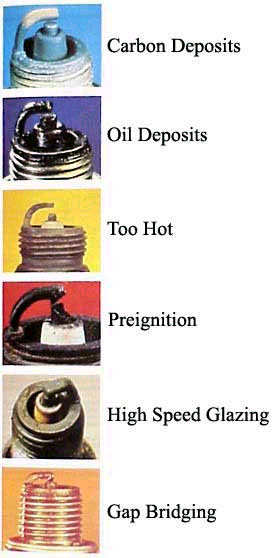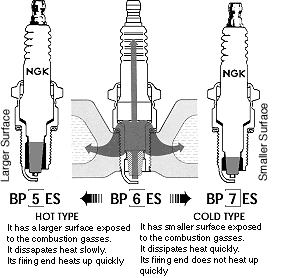Sparkplug Guide
Motorcycle Sparkplug Maintenance Tips to keep your motorcycle at peak condition.

Typical Motorcycle Sparkplug
Motorcycle Sparkplug Maintenance
Tip: Correctly reading a spark plug can save you a lot of time and money.
Sparkplugs:
Types
You may of noticed that there are hundreds of types, sizes and brands of spark plugs on the market. But out of that huge selection, only a handful will work with the motorcycle engine you own. Also different brands (NGK, Bosch, DENSO, Champion, Esc) will work better on different types of engines.
As a general rule of thumb, use the sparkplug your manufacturer recommends for your motorcycle (same brand and part number). Unfortunately some spark plugs are very specific to a type of engine and make only for that engine such as the NGK ME8 for $34.23 per sparkplug, compared to the "normal" price of $2-4 per sparkplug.
Reading a spark plug correctly: (clickable chart)
There are two different main ways to read a spark plug. #1. The first way is to just unscrew it out of the engine and take a look at the end of it, matching the chart below. #2. The second way is the same as #1 except you go for a really hard high revving ride on the bike, pull over and then unscrew each plug to read them. (Just make sure to use gloves as they will be very hot).
A spark plug can easily and quickly tell you the condition of an engine (good or poor), how it is running (rich or lean) and how much it will cost to fix it.


Symptoms: Dry sooty deposits indicate a rich mixture or weak ignition. Causes misfiring, hard shifting and hesitation.
Recommendations: Check for a clogged air element, high float level, sticky choke and worn ignition points. Use a spark plug with a longer core nose for greater anti-fouling protection.
Symptoms: Oily coating caused by poor oil control. Oil is leaking past worn valve guides or piston rings into the combustion chamber. Causes hard starting, misfiring and hesitation.
Recommendations: Correct the mechanical condition with necessary repairs and install new plugs.
Symptoms: Blistered, white insulator, eroded electrode and absence of deposits. Results in shortened plug life.
Recommendations: Check for the correct plug heat range, over-advanced ignition timing, lean fuel mixture, intake manifold vacuum leaks and sticking valves. Check the coolant level and make sure the radiator is not clogged.
Symptoms: Melted electrodes. Insulators are white, but may be dirty due to misfiring of flying debris in the combustion chamber. Can lead to engine damage.
Recommendation: Check for the correct plug heat range, over-advanced ignition timing, lean fuel mixture, clogged cooling system and lack of lubrication.
Symptoms: Insulator has yellowish, glazed appearance. Indicate that combustion chamber temperatures have risen suddenly during hard acceleration. Normal deposits melt to form a conductive coating. Causes misfiring at high speeds.
Recommendation: Install new plugs. Consider using a colder plug if driving habits warrant.
Symptoms: Combustion deposits lodge between the electrodes. Heavy deposits accumulate and bridge the electrode gap. The plug ceases to fire… resulting in a dead cylinder.
Recommendation: Locate the faulty plug and remove the deposits from between the electrodes.
Symptoms: Brown to grayish-tan color and slight electrode wear. Correct heat range for engine and operating conditions.
Recommendations: When new spark plugs are installed replace with plugs of the same heat range.
Symptoms: Light brown deposits encrusted on the side or center electrodes or both. Derived from oil and/or fuel additives. Excessive amounts may mask the spark, causing misfiring and hesitation during acceleration.
Recommendation: If excessive deposits accumulate over a short time or low mileage, install new valve guide seals to prevent seepage or oil into the combustion chambers. Also try changing gasoline brands.
Symptoms: Rounded electrodes with a small amount of deposits on the firing end. Normal color. Causes hard starting in damp or cold weather and poor fuel economy.
Recommendation: Replace with new plugs of the same heat range.
Symptoms: Insulators may be cracked or chipped, improper gap setting techniques can also result in a fractured insulator tip. Can lead to piston damage.
Recommendation: Make sure the fuel antiknock values meet engine requirements. Use care when setting the gaps on new plugs. Avoid lugging the engine.
Symptoms: After long periods of misfiring, deposits can loosen when normal combustion temperature is restored by an overdue tune-up. At high speeds, deposits flake off the piston and are thrown against the hot insulator, causing misfiring.
Recommendations: Replace the plugs with new ones or clean and reinstall the originals.
Symptoms: May be caused by a foreign object in the combustion chamber or the piston striking an incorrect reach (too long) plug. Causes a dead cylinder and could result in piston damage.
Recommendation: remove the foreign object from the engine and/or install the correct reach plug.
Sparkplug Caps:
Tip: Don't use decorative or spark arching type sparkplugs.
There are many different styles and types of sparkplug caps. Try to use the sparkplug cap that best matches the angle between the spark plug wire and spark plug itself. No matter what shape the spark plug cap is, is will perform the same.
Try to avoid "decorate" or spark arching type spark plug caps as they will LOWER the power to the sparkplug and you will have a weaker spark on stock systems.

Types of Motorcycle Spark Plug Caps
Tip: If you use the exact same sparkplug as your motorcycle manufacturer recommends the sparkplug should be (99%) properly gapped to the correct size. Checking a gap only takes seconds to do.
Always check that the spark plug gap is compatible with the engine manufacturers specification. A gap that is too small means that the spark duration will be very quick and the spark will be thin and weak. The consequences of this may be bad starting and high exhaust emission levels. This will result in an increase in fuel consumption. If the gap is set too large, the ignition system will not be able to cope with the demands and a misfire situation will occur. Some wide gap spark plugs have a longer ground electrode to accommodate a wide gap setting. These must be used where specified, as opening up a standard plug to a wider gap setting may result in the electrodes not running parallel to each other. This could result in abnormal and premature electrode wear.
Hot and Cold Sparkplugs
Tip: It is better to fix the problem than to change the sparkplug to patch it up.
Why Hot and Cold Sparkplugs? Using a hotter or colder sparkplug can be just the fix to an engine problem. Very basely, if your motorcycle engine is running hot then try using a colder plug, if it is running hot try a colder plug.

NGK diagram showing insulator and heat range
Hot Plug
- has a longer insulator nose length
- less heat is absorbed by the plug and transferred to the cooling system
- the plug runs at a higher temperature
- the plug is more prone to pre-ignition (if greater than 850 degrees C)
- NGK BP5ES is hotter than a BP7ES plug.
- An overheated plug will be white with brown spots.
Cold Plug
- has a shorter insulator nose length
- more heat is absorbed by the plug and transferred to the cooling system
- the plug runs at a lower temperature
- the plug is more prone to fouling (if less than 500 degrees C)
- NGK BP7ES is cooler than a BP5ES plug.
- A fouled plug will be black and sooty.
Any of the following situations can increase spark plug temperature:
-Lean air/fuel mixtures-Increasing compression
-Forced induction (Supercharging, turbocharging or Nitrous)
-Camshaft change
-Advancing ignition timing
-Higher engine speed
-Higher engine load
-Lower air temperature (more dense air resulting in leaner air/fuel mixture)
-Lower humidity (more dense air resulting in leaner air/fuel mixture)
Source: Totalmotorcycle.com

No comments:
Post a Comment